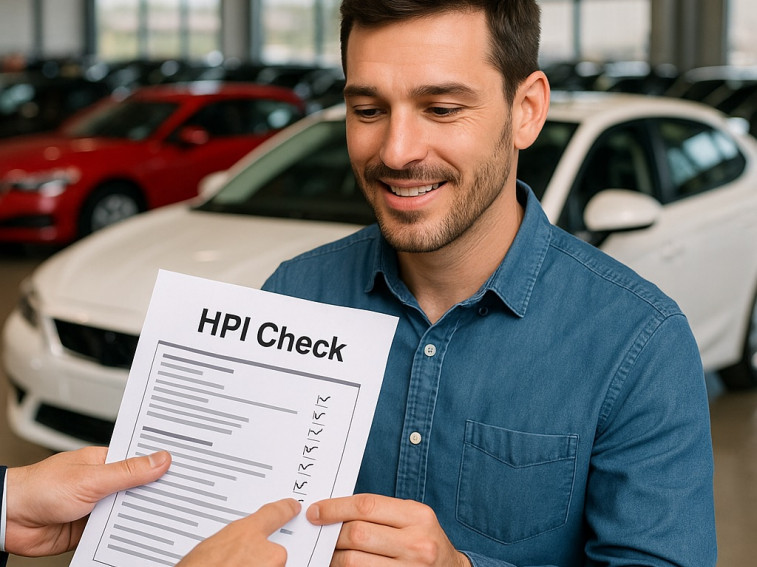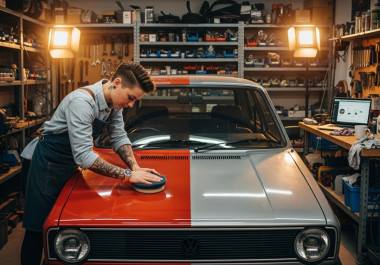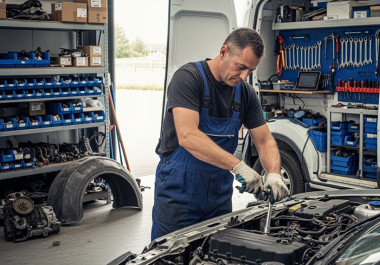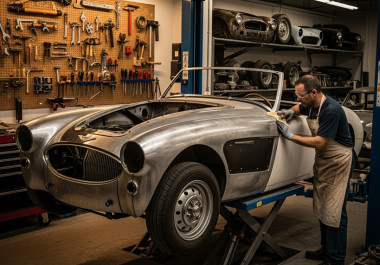There's an old saying in the motor trade: "Buy in haste, repent at leisure." It’s a simple warning. If you don't do your homework, you’re going to get stung. This is especially true at a car auction. The biggest mistake any newcomer can make is falling for a shiny car without checking its past.
This is where an HPI check for car auctions is so important. It’s not an optional extra. It is the single best piece of insurance against buying a car with a hidden and expensive history. Think of it as the car's CV. You wouldn't hire someone without checking their references, so why spend thousands on a car without doing the same?
For any auction, whether it’s a physical sale or an online platform like RAW2K, a history check is key. It helps you bid with confidence because it tells you the things a seller might have forgotten to mention.
So, What Exactly Is an HPI Check?
HPI stands for Hire Purchase Information. The company started many years ago to stop people from accidentally buying cars that still had finance owed on them. Over time, their checks became much more detailed. Now, "HPI" is a brand name, but it’s become the common term for any full vehicle history check. It's a bit like how people say "Hoover" for any vacuum cleaner.
A proper check searches a whole network of official databases. This includes records from the DVLA, the police, and insurance companies. You just need the car's registration number. In a few seconds, it pulls back a report that tells you the car's complete life story.
The Big Three: What a History Check Looks For
A history check looks at dozens of things. However, it is designed to catch three major issues that could cost you a lot of money.
1. Outstanding Finance
This is the most common major problem. It’s estimated that around one in four cars checked has some form of finance attached. If you buy a car with outstanding finance, you do not legally own it. The finance company does. They have the legal right to repossess the vehicle, leaving you with nothing. It doesn't matter that you paid for it in good faith. The debt is tied to the car, not the person. This is the number one reason to get a check.
2. Insurance Write-Offs
Has the car been in a serious accident? An HPI check will show if it has ever been declared a write-off by an insurer. You will see official codes for this:
-
Category S (Structural): This means the car has suffered damage to its structural frame. It has since been professionally repaired and deemed safe to return to the road.
-
Category N (Non-structural): This means the damage was cosmetic or to non-structural parts, like bumpers, panels, or headlights. The core structure of the car was not damaged.
There’s nothing wrong with buying a Cat S or N car if it’s been repaired to a high standard. In fact, they can be great value. But you must know about it beforehand. A car with a salvage history is worth significantly less than a straight one, and it can affect your insurance options.
3. Stolen Vehicles
This is less common, but it is a complete nightmare. If the check reveals the car is on the Police National Computer as stolen, you must not buy it. If you do, you will lose the car and all the money you paid for it. The police will return the car to its rightful owner or the insurance company, and you will be left with nothing.
A Story from the Trade: The "Bargain" BMW
Consider the story of a young lad just starting out in the trade. He went to an auction and saw a beautiful, nearly-new BMW 3 Series. The price seemed too good to be true. He got caught up in the excitement and, against all advice, he didn't run a check on it. He won the car, paid his money, and was absolutely chuffed with his bargain.
Three weeks later, a recovery truck turned up at his house. The car had £12,000 of finance owing on it from the previous owner, who had stopped making payments. The finance company took the car, and there wasn't a single thing he could do. His "bargain" cost him over £15,000 and nearly finished his business before it had even started. A £20 history check would have saved him all that grief.
How to Use an HPI Check in an Auction
So, how do you fit this vital check into the fast-paced auction environment? You have two main options.
Option 1: Check Before You Bid
This is the smartest way to do it. As soon as you see a car you’re interested in, get the registration number and run a check. You can do this from the online catalogue for one of our motorcycle auctions or during a physical viewing.
This arms you with all the information you need. If the report comes back clear, you can bid with confidence. If it flags an issue, like a Cat N write-off, you can make an informed decision. You might still decide to bid, but you’ll adjust your maximum price to reflect the car's history.
Option 2: Rely on the Auction House
Many reputable auction houses, including RAW2K, will run their own checks on the vehicles they sell. The results of these checks will be included in the vehicle's description. You should look for clear phrases like "HPI Clear" or "No outstanding finance reported."
This provides a good level of reassurance and contributes to vehicle auction transparency. However, for your own peace of mind, especially on a high-value vehicle, spending a few quid on your own independent check is never a bad idea. It's a small price to pay for certainty.
What Else Can a Check Tell You?
Beyond the big three issues, a good history check can reveal other useful information:
-
Mileage Discrepancies: It checks the mileage against previous records from MOTs and services. If it spots a potential "clocking" issue where the mileage has been rolled back, it will flag it.
-
Number Plate Changes: A car that has had a lot of private plates on it can sometimes be a way of hiding its past. The check will show you the history of plate changes.
-
Logbook Check: It can verify that the V5C logbook number is a genuine, current document and hasn't been reported as stolen.
-
Import/Export Status: It will tell you if the car was originally imported into the UK, which can affect its value and insurance.
Final Thoughts: Your Best Defence
In the exciting and sometimes chaotic environment of a car auction, an HPI check for car auctions is your best defence against a bad decision. It cuts through the sales patter and gives you the cold, hard facts about a vehicle's past.
It allows you to properly understand the vehicle auction transparency of the sale. This means you can bid with your head, not just your heart. Whether you’re a seasoned dealer or a first-time buyer, it’s a small investment that can save you a fortune. Never, ever bid without one.




